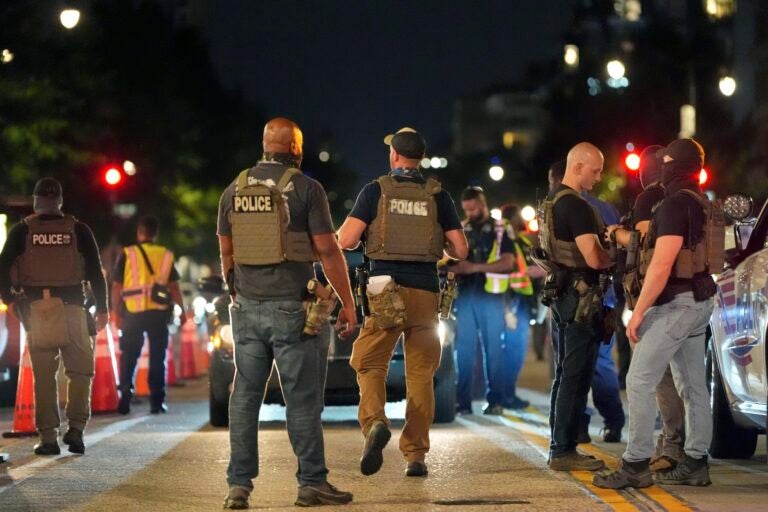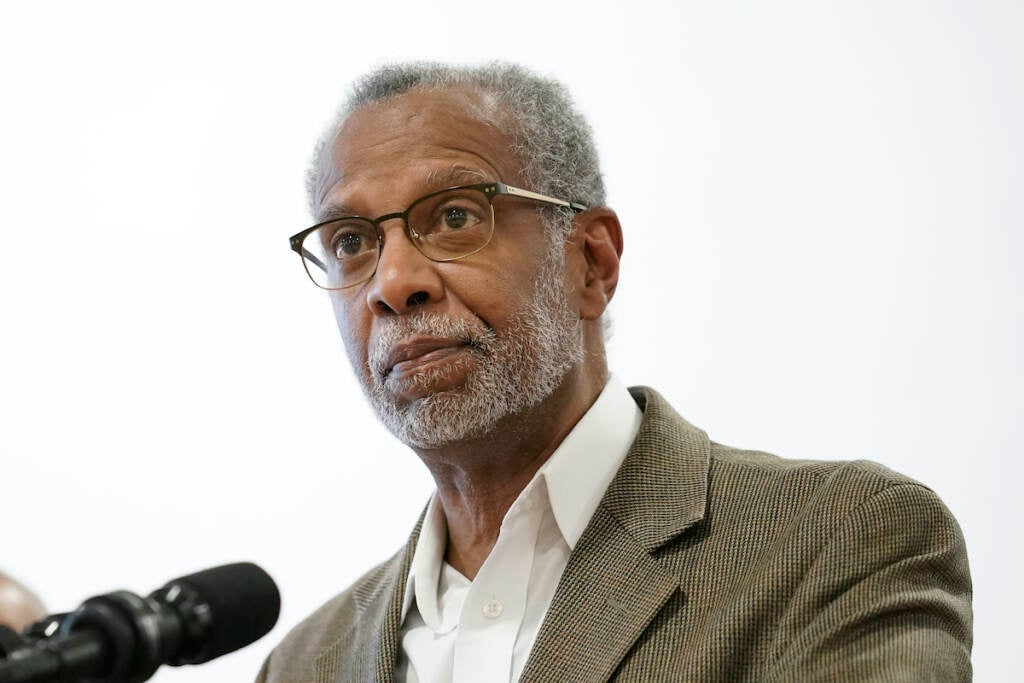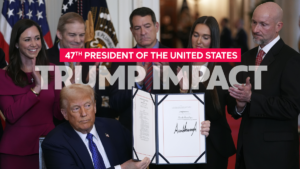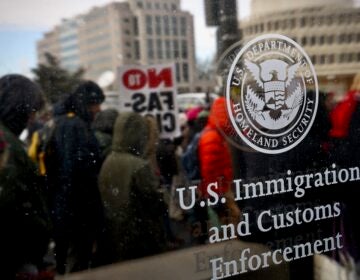Pennsylvania legislator to introduce bill blocking federal takeover of local police
State Sen. Art Haywood, of Montgomery County, wants to prevent President Donald Trump from taking over police in Pennsylvania like he did in Washington, D.C.
Listen 0:53
Department of Homeland Security Investigations agents join Washington Metropolitan Police Department officers as they conduct traffic checks at a checkpoint along 14th Street in northwest Washington, Wednesday, Aug. 13, 2025, in Washington. (AP Photo/Alex Brandon)
From Delco to Chesco and Montco to Bucks, what about life in Philly’s suburbs do you want WHYY News to cover? Let us know!
Despite violent crime in the nation’s capital reaching a 30-year low, President Donald Trump on Monday seized control of the Metropolitan Police Department and activated Washington, D.C.’s National Guard.
Trump insisted the move was necessary to “restore law and order” and suggested he may target other cities, listing five that are all led by Black mayors at a news conference earlier this week.
In response, state Sen. Art Haywood is planning to introduce legislation to place Pennsylvania’s more than 1,200 municipal police departments and the state troopers off limits from a potential federal takeover.
“We want to make sure that we maintain the local control in the police departments as well as the state troopers that we have in Pennsylvania,” Haywood told WHYY News.

Trump’s action was immediately met with criticism from elected Democrats, pushback from residents, worry from housing advocates, and support from political allies and D.C.’s police union.
Philadelphia District Attorney Larry Krasner condemned the takeover and warned the president against sending in National Guard troops alongside religious leaders in West Philadelphia.
“The president is moving quickly forward on his desire to be a dictator,” said Haywood, whose district encompasses parts of Montgomery County and Philadelphia.
Can Trump take over police in other U.S. cities? Legal experts say ‘no’
Legal scholars generally agree that Trump would have a difficult time finding any justification for such a takeover in other U.S. cities.
The District of Columbia Home Rule Act of 1973 gives the president the power to temporarily wrest control of the capital’s police during emergencies.
Washington D.C. is not a state and doesn’t benefit from broader independence from the federal government.
“Legally, there is no home rule act for any other city in the country,” said Craig Green, a professor at Temple University’s Beasley School of Law. “There is no statutory authority from Congress that would allow the president to take over a state or local police department or a state or local police personnel.”
Green doesn’t see any loopholes. He said any proposed legislation would serve a political purpose rather than a legal one.
“The purpose is to let the commonwealth know that state authority, at least rhetorically, is under threat and to signal what side of the fence the Pennsylvania state government is on,” Green said.
Both Green and Haywood cited the Trump administration’s track record of allegedly ignoring court orders and legal precedence.
“Now is the time to make sure that we have every extra protection because the behavior of the president is very clear in the last six months,” Haywood said.
National Guard usage presents a separate test for federalism, policing
While Green rejected the idea of Trump finding legal footing for taking over police, he said there should be concerns regarding the potential use of the National Guard in other cities.
“I think the Trump administration — several times, if not many times — has shown that they will do dramatic, unprecedented, even radical things when it suits their political purposes,” Green said, citing Trump’s deployment of the National Guard to Los Angeles.
A federal judge is currently deciding whether the administration violated federal law when it ordered troops to accompany Immigration Customs and Enforcement agents during raids in California.
Green said there was nothing justifying that use of military force, yet the administration pushed forward against the will of the city and California Gov. Gavin Newsom. He called it a “real threat to federalism.”
“But I think more than that — that kind of centralization, that kind of military garb and equipment and mobilization — that’s the kind of thing that prompts people to talk about authoritarianism and totalitarianism,” Green said. “That would be the worst set of images for those kinds of words that I think we’ve had in the United States for probably 60 or 70 years.”
Rory Kramer, an associate professor of sociology at Villanova University, said Trump’s actions are both “performative” and “disturbing.” His research looks into the intersection of race and policing.
“I’d hope that police would see this as an affront to them that they’re not doing good enough, but that’s not really how they see it,” Kramer said, citing a shift of policing from a guardian to warrior mentality.
He said federalizing the National Guard invites tension between citizens and local police.
“That’s a bad situation and part of what I think some political actors who support these types of moves want is that they want that showdown between protesters and guardsmen — and that’s disturbing and that’s awful,” Kramer said.
His biggest concern with policing and society is that the distance between the community and law enforcement is widening — and thus thrusting neighborhoods away from “actual justice.”
“All of this rhetoric, all of that just leads to police being more willing to use force, more willing to break rules, more willing to see themselves as at war rather than as a part of a community that is trying to do right by each other,” Kramer said.

Get daily updates from WHYY News!
WHYY is your source for fact-based, in-depth journalism and information. As a nonprofit organization, we rely on financial support from readers like you. Please give today.







